| Secretary of State for the Colonies | Term of office | Party | Ministry | Monarch
(Reign) |
|---|
|  | Sir George Grey, Bt.
MP for Morpeth | 12 June
1854 | 8 February
1855 | Whig | Aberdeen
( Peelite–Whig ) | Victoria

(1837–1901) |
|  | Sidney Herbert
MP for South Wiltshire | 8 February
1855 | 23 February
1855 | Whig | Palmerston I |
|  | Lord John Russell
MP for City of London | 23 February
1855 | 21 July
1855 | Whig |
| 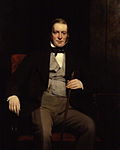 | Sir William Molesworth, Bt.
MP for Southwark | 21 July
1855 | 21 November
1855 | Radical |
|  | Henry Labouchere
MP for Taunton | 21 November
1855 | 21 February
1858 | Whig |
|  | Edward Stanley
Lord Stanley
MP for King's Lynn | 26 February
1858 | 5 June
1858 | Conservative | Derby–Disraeli II |
|  | Sir Edward Bulwer-Lytton
MP for Hertfordshire | 5 June
1858 | 11 June
1859 | Conservative |
|  |
Henry Pelham-Clinton
5th Duke of Newcastle
(1811–1864) | 18 June
1859 | 7 April
1864 | Liberal | Palmerston II |
| 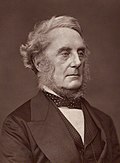 | Edward Cardwell
MP for Oxford | 7 April
1864 | 26 June
1866 | Liberal |
| Russell II |
|  | Henry Herbert
4th Earl of Carnarvon
(1831–1890) | 6 July
1866 | 8 March
1867 | Conservative | Derby–Disraeli III |
|  |
Richard Temple-Grenville
3rd Duke of Buckingham and Chandos
(1823–1889) | 8 March
1867 | 1 December
1868 | Conservative |
|  | Granville Leveson-Gower
2nd Earl Granville
(1815–1891) | 9 December
1868 | 6 July
1870 | Liberal | Gladstone I |
| 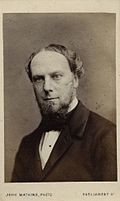 | John Wodehouse
1st Earl of Kimberley
(1826–1902) | 6 July
1870 | 17 February
1874 | Liberal |
|  | Henry Herbert
4th Earl of Carnarvon | 21 February
1874 | 4 February
1878 | Conservative | Disraeli II |
|  | Sir Michael Hicks Beach, Bt.
MP for Gloucestershire East | 4 February
1878 | 21 April
1880 | Conservative |
|  | John Wodehouse
1st Earl of Kimberley
(1826–1902) | 21 April
1880 | 16 December
1882 | Liberal | Gladstone II |
|  | Edward Stanley
15th Earl of Derby
(1826–1893) | 16 December
1882 | 9 June
1885 | Liberal |
|  | Frederick Stanley
MP for Blackpool | 24 June
1885 | 28 January
1886 | Conservative | Salisbury I |
|  | Granville Leveson-Gower
2nd Earl Granville
(1815–1891) | 6 February
1886 | 20 July
1886 | Liberal | Gladstone III |
|  | Edward Stanhope
MP for Horncastle | 3 August
1886 | 14 January
1887 | Conservative | Salisbury II |
|  | Henry Holland
1st Baron Knutsford
| 14 January
1887 | 11 August
1892 | Conservative |
| 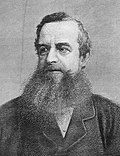 | George Robinson
1st Marquess of Ripon
(1827–1909) | 18 August
1892 | 21 June
1895 | Liberal | Gladstone IV |
| Rosebery |
| 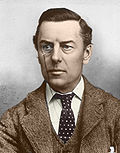 | Joseph Chamberlain
MP for Birmingham West | 29 June
1895 | 16 September
1903 | Liberal Unionist | Salisbury
(III & IV)
( Con.–Lib.U. ) |
Edward VII

(1901–1910) |
Balfour
( Con.–Lib.U. ) |
|  | Alfred Lyttelton
MP for Warwick and Leamington | 11 October
1903 | 4 December
1905 | Liberal Unionist |
|  | Victor Bruce
9th Earl of Elgin
(1849–1917) | 10 December
1905 | 12 April
1908 | Liberal | Campbell-Bannerman |
|  | Robert Crewe-Milnes
1st Marquess of Crewe
(1858–1945) | 12 April
1908 | 3 November
1910 | Liberal | Asquith
(I–III) |
George V

(1910–1936) |
|  | Lewis Vernon Harcourt
MP for Rossendale | 3 November
1910 | 25 May
1915 | Liberal |
|  | Bonar Law
MP for Bootle | 25 May
1915 | 10 December
1916 | Conservative | Asquith Coalition
( Lib.–Con.–Lab. ) |
|  | Walter Long
MP for Westminster St George's [nb 1]
(1854–1924) | 10 December
1916 | 10 January
1919 | Conservative | Lloyd George
(I & II)
( Lib.–Con.–Lab. ) |
| 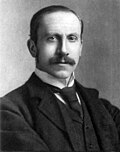 | Alfred Milner
1st Viscount Milner
(1854–1925) | 10 January
1919 | 13 February
1921 | Liberal |
|  | Winston Churchill
MP for Dundee | 13 February
1921 | 19 October
1922 | Liberal |
|  |
Victor Cavendish
9th Duke of Devonshire
(1868–1938) | 24 October
1922 | 22 January
1924 | Conservative | Law |
| Baldwin I |
|  | James Henry Thomas
MP for Derby | 22 January
1924 | 3 November
1924 | Labour | MacDonald I |
|  | Leo Amery
MP for Birmingham Sparkbrook | 6 November
1924 | 4 June
1929 | Conservative | Baldwin II |
| 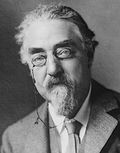 | Sidney Webb
1st Baron Passfield
(1859–1947) | 7 June
1929 | 24 August
1931 | Labour | MacDonald II |
|  | James Henry Thomas
MP for Derby | 25 August
1931 | 5 November
1931 | National Labour | National I
( N.Lab.–Con.–Lib.N.–Lib. ) |
|  | Philip Cunliffe-Lister
MP for Hendon | 5 November
1931 | 7 June
1935 | Conservative | National II
( N.Lab.–Con.–Lib.N.–Lib. ) |
| 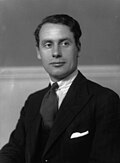 | Malcolm MacDonald
MP for Bassetlaw | 7 June
1935 | 22 November
1935 | National Labour | National III
( Con.–N.Lab.–Lib.N. ) |
|  | James Henry Thomas
MP for Derby | 22 November
1935 | 22 May
1936 | National Labour |
Edward VIII

(1936) |
|  | William Ormsby-Gore
MP for Stafford | 28 May
1936 | 16 May
1938 | Conservative |
George VI

(1936–1952) |
National IV
( Con.–N.Lab.–Lib.N. ) |
|  | Malcolm MacDonald
MP for Ross and Cromarty | 16 May
1938 | 12 May
1940 | National Labour |
Chamberlain War
( Con.–N.Lab.–Lib.N. ) |
| 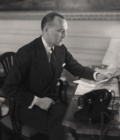 | George Lloyd
1st Baron Lloyd
(1879–1941) | 12 May
1940 | 4 February
1941 | Conservative | Churchill War
(All parties) |
|  | Walter Guinness
1st Baron Moyne
(1880–1944) | 8 February
1941 | 22 February
1942 | Conservative |
|  | Robert Gascoyne-Cecil
Viscount Cranborne
MP for South Dorset | 22 February
1942 | 22 November
1942 | Conservative |
|  | Oliver Stanley
MP for Westmorland | 22 November
1942 | 26 July
1945 | Conservative |
Churchill Caretaker
( Con.–N.Lib. ) |
| 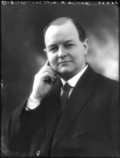 | George Henry Hall
MP for Aberdare | 3 August
1945 | 4 October
1946 | Labour | Attlee
(I & II) |
|  | Arthur Creech Jones
MP for Shipley | 4 October
1946 | 28 February
1950 | Labour |
|  | Jim Griffiths
MP for Llanelli | 28 February
1950 | 26 October
1951 | Labour |
|  | Oliver Lyttelton
MP for Aldershot | 28 October
1951 | 28 July
1954 | Conservative | Churchill III |
Elizabeth II

(1952–2022) |
|  | Alan Lennox-Boyd
MP for Mid Bedfordshire | 28 July
1954 | 14 October
1959 | Conservative |
| Eden |
Macmillan
(I & II) |
| 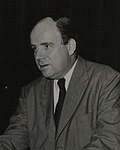 | Iain Macleod
MP for Enfield West | 14 October
1959 | 9 October
1961 | Conservative |
|  | Reginald Maudling
MP for Barnet | 9 October
1961 | 13 July
1962 | Conservative |
|  | Duncan Sandys
MP for Streatham | 13 July
1962 | 16 October
1964 | Conservative |
| Douglas-Home |
| 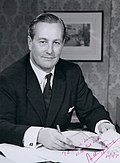 | Anthony Greenwood
MP for Rossendale | 18 October
1964 | 23 December
1965 | Labour | Wilson
(I & II) |
|  | Frank Pakenham
7th Earl of Longford
(1905–2001) | 23 December
1965 | 6 April
1966 | Labour |
|  | Frederick Lee
MP for Newton | 6 April
1966 | 1 August
1966 | Labour |
























































